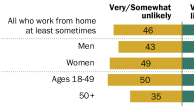Overview
There is broad public agreement that past government policies intended to address the financial crisis and recession have not worked. At the same time, there is very little agreement about what the government should do now to deal with the nation’s biggest economic concern – the job situation.

None of the options currently under discussion for dealing with the job situation are viewed as very helpful. In fact, fewer than four-in-ten say each of these proposals would help the job situation a lot: additional spending on public works (37%); cutting taxes for businesses (36%) or individuals (31%); budget cuts to reduce the deficit (34%); or providing money to state and local governments to help them avoid layoffs (33%).
The latest Pew Research/National Journal Congressional Connection Poll, sponsored by SHRM, which was conducted June 17-20 among 1,009 adults, finds that majorities do think each proposal would at least do a little to help the job situation. Relatively few say the proposals would not help the job situation at all, although slightly more say this about cutting personal income taxes (29%) than the other options.

The survey finds continued public skepticism about the impact of last year’s economic stimulus legislation, as well as the government’s loans to troubled banks and financial institutions. Six-in-ten (60%) say the stimulus has not helped the job situation while just a third (33%) say that it has helped.
A majority (54%) also says that the government’s loans to troubled financial institutions did not help prevent a more severe economic crisis, while 38% say it did help. Opinions about the impact of the financial bailout, like views of the stimulus, have changed little changed since April.
Little Enthusiasm for any Job Remedies

There are sizable partisan differences in views about the effectiveness of proposals to address the job situation. Still, none of these options gets an overwhelmingly positive response from Republicans, Democrats or independents.
Indeed, cutting business taxes is the only proposal viewed by a majority of Republicans (55%) as helping the job situation a lot. None of the options are viewed as very helpful by a majority of Democrats or independents.
More than four-in-ten Democrats (44%) say additional spending on public works would do a lot to help the job situation while 40% say the same about providing money to state and local governments to avoid layoffs. Far fewer see tax cuts for businesses (22%), budgets cuts to reduce the deficit (22%) or tax cuts for individuals (20%) as helping a lot. Independents’ views about proposals to improve the job situation show little variance – between 34% and 37% view them as helping a lot.
Still Skeptical of Stimulus, TARP

People with less education and lower incomes are particularly skeptical of the impact of last year’s economic stimulus legislation on the job situation.
Just 28% of those with no more than a high school education say the stimulus has helped the job situation, compared with 44% of college graduates. Only about three-in-ten (29%) of those with family incomes of less than $30,000 view the impact of the stimulus positively; that compares with 39% of those with family incomes of $75,000 or more.
Republicans have an overwhelmingly negative view of the effect of the stimulus: 80% say it has not helped the job situation. Most independents (59%) also say the stimulus has not helped. A narrow majority of Democrats (53%) say the stimulus has helped the job situation, though 40% disagree.

The public’s views of the impact of government loans to troubled banks and financial institutions have changed little since April. But college graduates and Republicans, in particular, have grown more skeptical of the bailout.
Fewer than half of college graduates (45%) now say that the bailout helped prevent a more severe economic crisis, down from 56% in April. And just a quarter of Republicans (25%) now say that the financial bailout helped prevent a worse crisis, down from 35% in April. Opinions among Democrats and independents are virtually unchanged over the last two months.
MORE GIVE ADMINISTRATION POOR RATINGS FOR OIL LEAK RESPONSE

Over the past month, the public’s views of how both the Obama administration and BP have handled the Gulf oil leak have changed only modestly. Still, a significantly higher percentage gives the administration a poor rating now (35%) than did so last month (26%), largely because Republicans have grown much more critical of its handling of the oil leak.
The administration continues to get much higher marks for its response to the oil leak than does BP. Currently, 33% rate the administration’s response to the leak as excellent or good; another 29% say the administration has done only fair. Both measures are little changed from May.

By contrast, just 18% give positive ratings to BP’s response, while 28% say it has been only fair. And even with the rise in poor ratings for the Obama administration, many more rate BP’s response to the oil leak as poor (49%) than say that about the administration’s response (35%).
The latest Pew Research/National Journal Congressional Connection Poll, sponsored by SHRM, which was conducted June 17-20 among 1,009 adults, finds that opinions about the administration’s response to the oil leak have become more partisan since May. Currently, 64% of Republicans rate the administration’s response as poor, up from 44% last month. Republicans now are less critical of BP than of the administration; fewer than half (47%) of Republicans say BP has done a poor job in responding to the leak.
By contrast, Democratic evaluations of the administration’s response to the leak have become somewhat more positive (48% excellent/good in May, 59% excellent/good today). As was the case in May, independents are divided: 30% say the administration has done an excellent or good job, 31% only fair, while 35% say the administration has done a poor job in responding to the leak.
MIXED VIEWS OF KAGAN NOMINATION, MANY OFFER NO OPINION
With Senate hearings on Elena Kagan’s nomination to the Supreme Court set to begin June 28, the public remains divided over whether she should be confirmed, though many still express no opinion. On balance, more Americans support Kagan’s nomination than oppose it (by 33% to 25%), but more than four-in-ten (42%) say they do not know or decline to offer an opinion.
The latest Pew Research/National Journal Congressional Connection Poll, sponsored by SHRM, which was conducted June 17-20 among 1,009 adults, finds that views of Kagan have changed little since President Obama announced his choice on May 10. A Congressional Connection Poll conducted May 13-16 found 33% supporting Kagan’s confirmation, 21% opposed, and 46% with no opinion.
In recent weeks, the nomination has received scant coverage and generated little controversy. According to the Pew Research Center’s Project for Excellence in Journalism, the nomination accounted for 13% of the newshole in the week immedia tely after President Obama unveiled his pick, but 1% or less of overall news coverage in each succeeding week.

Heading into the Senate Judiciary Committee hearings, views of Kagan are comparable to those of President George W. Bush’s second and third nominees, Harriet Miers and Samuel Alito. Miers, a one-time White House counsel, withdrew her nomination in the fall of 2005 amid questions about her qualifications. Several months later, the Senate, then controlled by Republicans, confirmed Alito on a 58-42 vote on Jan. 31, 2006.
The divided opinion about Kagan stands in contrast to the broader support for Sonia Sotomayor last year after Obama nominated the former appeals court judge to the Supreme Court. Last June, twice as many said the Senate should confirm Sotomayor as opposed her confirmation (50% vs. 25%). The Senate voted 68-31 to confirm Sotomayor on Aug. 6, 2009.
Continued Partisan Divide over Kagan Nomination

More than half (54%) of Democrats say Kagan should be confirmed, compared with 17% of Republicans and 33% of independents. Democratic support is unchanged from when the question was first asked in mid-May.
Among Republicans, 43% say Kagan should not be confirmed, slightly higher than the 35% that said this in May. Independents mirror the public as a whole – 33% say Kagan should be confirmed, while 25% say she should not be. About four-in-ten in each group offer no opinion.
Last June, Sotomayor, whose nomination sparked more controversy than Kagan’s has so far, had broader support from all partisan groups. About seven-in-ten Democrats (69%) said she should be confirmed, along with 47% of independents and 30% of Republicans.
Currently, men are evenly split over Kagan’s nomination; 32% say she should be confirmed, 30% say she should not, while 38% offer no opinion. Women are somewhat more supportive (34% confirm vs. 20% oppose) while 46% have no opinion. Last year, nearly half of men (47%) supported Sotomayor’s confirmation while 28% were opposed. Women favored Sotomayor’s confirmation by more than two-to-one (52% to 22%).
No Consensus on Kagan’s Ideology

The survey also finds that many Americans are unsure of Kagan’s political ideology: 28% say they think she is liberal, while 24% say they see her as moderate. Just 7% see her as conservative. Four-in-ten (41%) offer no opinion or say they do not know.
Republicans are much more likely to see Kagan as liberal (45%) than Democrats (17%) or independents (29%). Democrats, meanwhile, are more likely to see the nominee as moderate. Close to four-in-ten (38%) say they think she is moderate, compared with 13% of Republicans and 23% of independents.




